- Home
- Phillip Tomasso
Absolute Zero Page 9
Absolute Zero Read online
Page 9
Ruiz had been correct. Whatever it was, it had moved to just beyond the banks of the ocean. For all intents and purposes, it moved toward them. Not straight on, but it took cover here and there. If it was actually taking cover, did that suggest intelligence, or simply natural born instinct? Was it in survival mode? Since he took a shot at it, did the thing now consider them the enemy? Would it have left them alone if they hadn’t fired on it? Would it now feel compelled to attack them?
Whatever it was did it now considered them prey?
Stanton stepped forward.
“What are you doing?” Ruiz asked.
“It went that way,” he said, and pointed with the barrel of his blaster.
“So we should be going that way.” Ruiz indicated a direction away from the fast-flowing ocean, the small waves moving between wide ice banks. Her entire body language motioned toward where the colony should be located. “We have two things that are more important. We are here to check on the people stationed at this facility. That used to be number one. The other thing we have to do is get out of this weather, this cold, or we’re going to die out here, Captain. With all due respect, that is now my number one mission. Reaching the colony. Getting inside out of the cold and staying alive. We can’t complete any objective if we’re out here wasting time hunting Neptunites.”
“Neptunites?”
“What else would you call it?”
“I don’t know. Extraterrestrial?” Stanton shook his head, his eyes still on the area where the thing slipped away. Best guess the creature was fifteen, twenty feet long. A head-to-head encounter might not go their way. Blasters or not. “Neptunites works.”
“Adam, we’re not going that way. I’m not going that way. I’m sorry, Captain. I know you’re not asking me for my opinion, but I say let’s get away from here. Let’s just walk away from that thing. When we reach the colony, we’ll report our findings to the commander. Let her figure out what she wants to do about it. She’s rank. It’s her mission. Her pay grade, Adam. We’re pilots. We fly fighters. It can’t just be me, but don’t you feel like a fish out of water?”
Angela Ruiz was correct. It made no sense going after something when they had no idea what it was or what it was capable of. Advancing was nothing shy of idiotic at this point. For all they knew, the creature was harmless. Friendly. He had no business even firing at the thing. It was unprovoked hostility on his part, an uncalled for response to an unknown situation. Training taught him better than that. His knee-jerk reaction had been the wrong decision no matter what way someone looked at it. “Okay, Ruiz. You’re right.”
They took steps backward. Slow. Steady. They put some distance between them and the ocean; between them and the creature. (And yet, Adam still almost labeled the bizarre specimen Monster in his mind).
Stanton and Ruiz never lowered their blasters. They kept them trained on the general area. Sweeping arcs left to right and back.
Stanton kept blinking. He monitored the map displayed in the upper corner of his faceshield. He saw a red blip for himself and one right next to his for Ruiz. No other blips present on the map. As far as their technology could muster, for miles around the two of them were alone on the planet surface.
Had the creature dived back into the ocean? Was that why it wasn’t visible on their indicators? Or did the alien just not register on the device because the thing was comprised of meat, flesh, and bone so different from humans the device scanning the immediate circumference had no idea what to look for?
His eyes played tricks. It seemed as if everything was moving, as if the entire planet surface might be alive. Crawling, closing in on them.
It reminded him of a road mirage. On hot, humid days in New York when he looked down a block, the street toward the horizon appeared wet and wavy, as if the pavement were moving. It was a refraction of light, he knew. It did not make the illusion any less … authentic. That was what he saw now, he hoped. A mirage. “Keep going, don’t stop.”
Ruiz said, “Don’t worry about me. I’m not stopping.”
“You are right. We’ll get to the colony and fill in the commander on what we’ve found,” Stanton said.
“We’ve already established that, Captain.” Ruiz moved with caution, but speed. Her taut, lithe body pivoted this way and that. The weapon swiveled with her, ready to blast if a fight found them. “I didn’t think anything lived on this planet.”
“Nothing was ever detected,” Stanton said and realized it reaffirmed his thought. The creatures did not show on the map. And apparently went undetected from earlier space probe missions. Amphibians suddenly came to mind. A thing that could survive both on land and in water. Even if the water was irrefutably toxic to humans, it apparently did not negatively affect the Neptunites. “Wasn’t supposed to be anything alive here. The air, the atmosphere, none of it is conducive to life.”
“None of it is conducive for human life. Seems like aliens might have different basic needs than oxygen and H2O. This toxic planet might be like the Florida Keys for them.”
“Them?” Stanton said. “I saw one. How many did you see?”
Ruiz stopped walking. “You saw only one? I saw two, maybe three.”
Chapter Twenty
Lieutenant Murray Bell sat in the pilot seat of the downed Eclipse shuttle. He left as much re-routed power as possible for life-support, while transferring the rest for operations. The temperature inside was a blistering forty-nine degrees Fahrenheit. He could manage fine in the cold. He was a big guy and prone to sweating whenever it was over sixty. Keeping the thermostat at forty-nine conserved energy.
He changed out several circuit breakers. Installed new wires where older ones looked fried, and with a multimeter verified voltage and current levels were where they should be. It was the moment of truth, he supposed, as he used the ship’s communicator.
“Eclipse Shuttle to Eclipse: come in. Eclipse Shuttle to the Eclipse: can you read me?”
He sat motionless, waiting. Anticipating.
Was he holding his breath? Breathing would not change the response. Either the Eclipse picked up the low-frequency transmission or they didn’t. And so he sighed, and then breathed as regularly as possible. In. Out. “Eclipse Shuttle to the Eclipse: Do you copy?”
Nothing. He eyed the control board in front of him. Everything indicated a signal was available, he was transmitting.
Bell shivered. Shrugged his shoulders. Maybe it was a tad colder than he would have liked. It was when his lips quivered and teeth chattered together he realized forty-nine pushed it. He would not adjust the temperature, though. Heating the ship, even just the cockpit, drained power. Rationing as much as possible bought precious little time, but time it did buy.
He knew he had survived worse, gotten out of hairier situations than this in the past. Stranded on a remote planet, separated from his team and the commander, might seem daunting to most, okay it was a bit daunting, but Bell was confident he would get past this. He would establish contact with Eclipse, and then don a spacesuit and catch up with the others.
Bell stopped and looked up and out the front portal.
Something moved outside. His breath caught. And once again, he held it.
He let his eyes scan across the expanse of blue and white snow. The diamond crust shined. Light radiated in rainbows. The storm was ending. He could see beyond a few feet through the plated glass.
He could see, but saw nothing out of the … what would he call it? The ordinary? … He depressed the communicator on his arm. “This is Lieutenant Bell. Commander, is that you outside the shuttle?”
They should be long gone by now. Halfway to the colony, if not there already.
Unless something went wrong and they doubled back.
He took another moment, rising out of the pilot’s seat and with his hands on the panel in front of him, leaned closer to the portal for a clearer view.
Nothing.
Freaky snow. Some wind.
Nothing was out there. No one was out t
here. His mind. His imagination. Now was not the time to come off the rails.
“I’m getting cabin fever,” he said aloud, and then laughed. “And I’m talking to myself.”
He turned his attention back to the work at hand. The leads from the multimeter touching wires he tugged free under the panel. Readings were spot on. He could not figure out why he was unable to contact the Eclipse. Could they be that far out of range? The storm above must be blocking the signal. That was the best explanation he could come up with, and it made the most sense.
There it was again.
Peripherally, he saw it. Something. Damned movement.
He looked up, but his view hadn’t changed at all. Snow. Wind. Nothing else.
Shaking his head, Bell stood up, wiped his hands down the thighs of his pants. “This is nuts.”
The hairs on his arm stood on end. It was a sensation he had not felt in some time. Panic. It was the only word he could relate the odd feeling with. Panic.
He could not shake the reaction. Breathing again, his breaths were quick and shallow. Something was out there, something was watching him. He did not know what it was, but he knew it was something, or someone.
“Commander Meyer?” He tried again.
Bell hated the sound of fear he heard in his own tone of voice. It reeked of cowardice. It was the being alone that bothered him. This was quickly turning into the worst situation he had ever found himself in, and thought scared him.
When he was a boy living on Earth, the plague spread fast. He lived in Alberta. Calgary, to be more specific. The Canadian government at the time put into place quarantine areas. The sick were rounded up and dropped off, kept behind barbed wire fencing.
When the soldiers came, conducting door-to-door, Bell remembered the terrified look in his father’s expression. The knock thundered against the solid wood door. Bell’s father’s eyes darted around the small ranch house. There weren’t many places for hiding.
Bell’s mother was in bed, too sick to move. His sister sat on the sofa, coughing.
Bell’s father placed a finger against his own lips as he shushed his daughter. “Please, angel. Please, don’t make a sound.”
Another knock.
The soldiers must have known someone was home, or they didn’t care. Perhaps they had orders to search every house whether occupied or vacant.
When the door smashed open, wood splintered and the door casing came free from the drywall. Bell’s father put his back to his children, protective, but ineffective.
Without wasting time, the soldiers ransacked the house. They collected the sick and left, ignoring his crying and pleading to leave his family alone. With shoves, kicks, and harsh words, the armed men knocked him out of their way.
Sitting by the window, back to the wall, Bell pulled his knees close to his chest and hugged them tightly. He had not moved the entire night. He had been terrified at the idea of moving. Instead, still and quiet, he sat listening. Every sound made him tremble. He worried the soldiers were coming back.
Part of him wanted them back. Let them take him. Then he could be with his family.
The other part of him was terrified at the idea of them returning.
He stayed inside his house for weeks. Alone. He ate the little bit of food left in the cupboards. He moved from room to room on all fours, afraid someone from outside would see him pass in front of a window and realize he was by himself.
His father had always warned him about the people outside. “The sick deserve our sympathy,” he had said, “but the healthy get are dangerous. They will come and take for themselves what little we’ve saved.”
The last thing he wanted to do was go outside.
When the food was gone, and there was absolutely nothing left to eat, he knew he faced a quandary. If he stayed inside the house, he would starve and die. If he ventured outside the house, he still could starve and might still end up dead. The thing was, leaving at least offered up some semblance of hope.
Some.
Shaking the memories out of his head, Bell yanked his sidearm from the holster. Someone or something was outside the shuttle. If it was the commander or someone from the crew, they might be in danger, or in need of help. They could be freezing outside. If it wasn’t the commander, if it wasn’t someone from the crew, then who in the hell was it?
Either way, he could not knowingly just sit idle.
He had to do something.
Bell knew he needed to check. “This is crazy. Absolutely nuts.”
Chapter Twenty-One
The only thing now on their side was the weather. The storm had passed. The wind still whipped, but not with the same ferocity as before. Thankfully, the insulated suits worked well.
Visibility had cleared and Commander Meyers saw the outline of the colony ahead. Despite the tragedy they had faced, they were now closer to sanctuary; they were a click or so away from the colony. For the first time since leaving the shuttle, Meyers actually believed they stood a chance.
Her heart was heavy, though. Meyers was not thrilled about having left Bell back with the shuttle, or O’Hearn’s body lying on the unstable ground behind them. Those decisions troubled her. She kept second-guessing her call. Maybe they should have attempted dragging the corpse. They covered a lot of ground since leaving him, though, moving forward at a determined pace.
Meyers knew, once they reached the colony, the colonists would have a better, lighter rover. Dispatching the rover a retrieval of both Bell and O’Hearn would be underway. The miners must know the terrain better, where it was safer to drive across and what soft ice spots to avoid.
She hoped. Today was proving to be a day centered around hope.
Commander Meyers knew the Neptune mission would not be simple. Galactic travel always posed dangers, threats. There were far too many variables involved. Planet exploration was an entirely different layer of problems or of potential problems.
Euphoric recruited some of the best minds. Engineers mapped out the trips and held roundtables discussing scenarios. The bright people, the Alphas, worked long hours, ensuring superiors that every possible issue, hiccup, predicament, and outcome was thoroughly accounted for, with multiple resolution options available. They were good at what they did. Theoretically speaking, of course.
Commander Meyers’ issue stemmed from one setback. They had lost all radio contact.
At least with radio contact, they could transmit the details of the crisis, let their powerful minds work on the problems, and await their solution.
They, instead, were stranded and left to their own devices.
Meyers was resourceful. Intelligent. You wouldn’t have become the commander of a ship like the Eclipse, otherwise, she told herself.
Poking the ground ahead of each step, Meyers did not let her thoughts slow their progress. Her eyes monitored the air supply gage inside the faceshield. There was just over a quarter left. Should be plenty.
Once they reached the colony, the first thing she would do is dispatch someone to pick up Bell and retrieve O’Hearn.
That kept her going.
One step at a time. She didn’t look back. They would be following her. She felt the weight on the rope around her waist. “I can see the colony,” she said, hoping her words encouraged.
It was slow. Tedious. Steady.
They made easy progress. Without knowing for certain, Meyers suspected they were no longer just walking on an iced-over ocean but were now trekking on solid ground. Still frozen, but it was more like ground underneath. Why else would they have built the colony compound in this area?
The urge to pick up the pace was strong and she had to fight it. Salvation was so close.
The colony loomed just ahead.
She wanted to ditch the stick she probed with and make a break for it. Everything inside of her screamed, “Run!”
Safety was the detailed features of the colony as it became clearer with each step taken. The structure became one of the greatest sanctuaries she had see
n in a long time.
_____
First Officer Mark Windsor, now acting commander of the Eclipse, hovered just beyond Officer Nathaniel Gaines’ workstation, with his arms folded. “That was them? That was Lieutenant Bell? Are you certain?”
“Aye. It was him.” Gaines punched keys, and toggled switches. “Signal was faint, but he was calling from the shuttle.”
“Can you get him back?” Windsor hated the way he felt. He had no control over anything. They had all been working at establishing contact with the shuttle, with the fighter escort, and all to no avail, until now.
It was a glimmer of hope.
“I continue hailing them,” Gaines said. “It does seem as if there is a connection now. Signal seems strong. When the shuttle passed through the storm, something must have gotten scrambled. Think Lieutenant Bell must have repaired whatever was wrong on his end. But he is not hearing us responding.”
“What about the starfighters? Captain Stanton?”
“I have not been able to reach his ship. Or any of the others in his squad,” Gaines said.
“Keep trying. They could be trying to reach us as well. It’s quite possible the storm merely blocked signals, and now that it is passing everything will go back to normal,” Windsor said. His mind was in hyperdrive. There were limited options available. They did not have the resources, or the staff, for a second rescue mission. That wasn’t exactly true. He could fly the second shuttle. Pile everyone in and get the hell off the planet. Shuttle was big enough. That wasn’t the problem. The danger was if anything went wrong, he’d be leaving the Eclipse with a worse than bare-bones staff, just barely enough members to man the vessel for a return trip home. So instead, he clung onto the idea that communications would soon be back online. “We’ve got to reach them. We need to know what’s going on down there.”

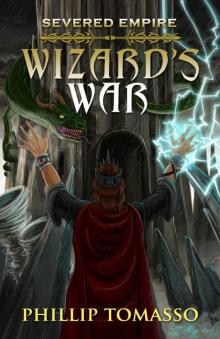 Severed Empire: Wizard's War
Severed Empire: Wizard's War Vaccination - 01
Vaccination - 01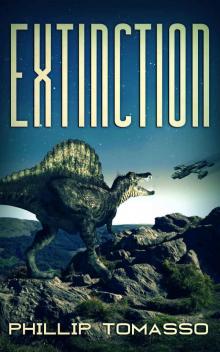 Extinction
Extinction Johnny Blade
Johnny Blade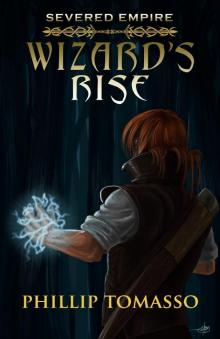 Severed Empire: Wizard's Rise
Severed Empire: Wizard's Rise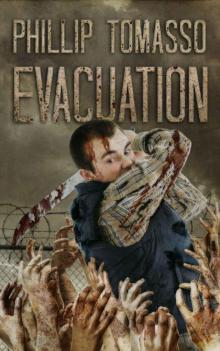 Evacuation - 02
Evacuation - 02 Absolute Zero
Absolute Zero Arcadia (Book 1): Damn The Dead
Arcadia (Book 1): Damn The Dead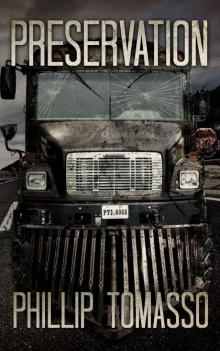 Preservation - 03
Preservation - 03